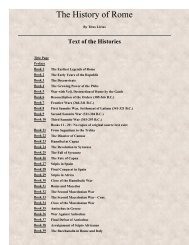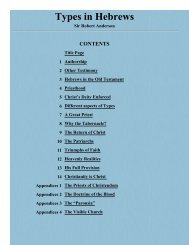The Person of the Holy Spirit - Table of Contents
The Person of the Holy Spirit - Table of Contents
The Person of the Holy Spirit - Table of Contents
Create successful ePaper yourself
Turn your PDF publications into a flip-book with our unique Google optimized e-Paper software.
prophecies (Gen 3:15; Isa 7:14; Matt 1:18, 20, 21, 22, 23; 2:11, 13, 20, 21; 12:48; 13:55; Mark 3:31; 6:3; Luke 1:35, 43; 2:5-<br />
7, 16, 34, 48, 51; 8:19, 20; John 19:25, 26, 27; Acts 1:14; Gal 4:4). <strong>The</strong> evidence is so abundant for <strong>the</strong> mo<strong>the</strong>rhood <strong>of</strong> Mary<br />
that no serious attempts have been made to deny it even on <strong>the</strong> part <strong>of</strong> liberal scholarship, though <strong>the</strong> Corinthian heresy<br />
denied that <strong>the</strong> conception was miraculous and held that Jesus was possessed only for a time with a heavenly spirit,1 and <strong>the</strong><br />
Docetics held that His body was unreal.<br />
3. <strong>The</strong> Nature <strong>of</strong> <strong>the</strong> Conception <strong>of</strong> Christ.<br />
An investigation into <strong>the</strong> nature <strong>of</strong> <strong>the</strong> conception <strong>of</strong> Christ has its chief difficulty in solving <strong>the</strong> problem <strong>of</strong> <strong>the</strong> origin <strong>of</strong> <strong>the</strong><br />
humanity <strong>of</strong> Christ. It is clear that Christ was born <strong>of</strong> Mary, yet certain features <strong>of</strong> His <strong>Person</strong> are quite distinct from <strong>the</strong><br />
human race. <strong>The</strong> problem <strong>of</strong> deity becoming part <strong>of</strong> humanity is a great miracle, but <strong>the</strong> origin <strong>of</strong> a sinless humanity is a<br />
problem <strong>of</strong> <strong>the</strong> first magnitude. Many questions could be asked. Did <strong>the</strong> humanity <strong>of</strong> Christ proceed from Mary alone? Was<br />
<strong>the</strong> humanity a product <strong>of</strong> generation or creation? Why was <strong>the</strong> imputation <strong>of</strong> sin upon <strong>the</strong> whole human race apparently nonoperative<br />
in <strong>the</strong> ease <strong>of</strong> Christ? Was His human nature sinless or merely sanctified? Such questions naturally arise in <strong>the</strong><br />
course <strong>of</strong> <strong>the</strong> study <strong>of</strong> <strong>the</strong> conception <strong>of</strong> Christ. To a large extent we are shut up to reason, without explicit revelation, but to<br />
<strong>the</strong> degree a solution can be found a defense <strong>of</strong> <strong>the</strong> conception <strong>of</strong> Christ from serious errors is furnished. A proper<br />
examination <strong>of</strong> this field <strong>of</strong> truth would obviate such doctrines as that <strong>of</strong> <strong>the</strong> immaculate conception <strong>of</strong> Mary and heresies in<br />
<strong>the</strong> statement <strong>of</strong> <strong>the</strong> hypostatic union. and <strong>the</strong> known attributes <strong>of</strong> God. <strong>The</strong> truth probably is that <strong>the</strong> conception <strong>of</strong> Christ is<br />
both generation and creation, generation in <strong>the</strong> sense that He was born <strong>of</strong> a woman who conceived by <strong>the</strong> <strong>Holy</strong> <strong>Spirit</strong>,<br />
creation in <strong>the</strong> sense that a Second Adam was <strong>the</strong> product, a member <strong>of</strong> <strong>the</strong> race and yet <strong>the</strong> Federal Head <strong>of</strong> a new race. By<br />
analogy, Abraham was at once a Gentile and <strong>the</strong> first <strong>of</strong> <strong>the</strong> Israelite fa<strong>the</strong>rs. Christ was at once a member <strong>of</strong> <strong>the</strong> race and <strong>the</strong><br />
Head <strong>of</strong> a new people.<br />
Owen advances <strong>the</strong> argument that <strong>the</strong> conception <strong>of</strong> Christ can be thought <strong>of</strong> as creation more accurately than generation:<br />
“This act <strong>of</strong> <strong>the</strong> <strong>Spirit</strong> was a creating act; not indeed like <strong>the</strong> first creating act, which produced <strong>the</strong> matter <strong>of</strong> all things out <strong>of</strong><br />
nothing; but like those subsequent acts <strong>of</strong> creation, whereby out <strong>of</strong> matter already prepared, things were made what <strong>the</strong>y<br />
were not before, and which <strong>the</strong>y had not active disposition to, nor concurrence in. So man was formed <strong>of</strong> <strong>the</strong> dust <strong>of</strong> <strong>the</strong><br />
earth, and woman <strong>of</strong> a rib taken from man. Thus in forming <strong>the</strong> body <strong>of</strong> Christ; though it was effected by an act <strong>of</strong> infinite<br />
creating power, yet it was made <strong>of</strong> <strong>the</strong> substance <strong>of</strong> <strong>the</strong> blessed Virgin.”3 Dorner seems to hold much <strong>the</strong> same view: “And<br />
<strong>the</strong> soul itself is not given by Mary nor by <strong>the</strong> race, but by a Divine creative act.”4 <strong>The</strong> viewpoint <strong>of</strong> Owen and Dorner,<br />
including as it does <strong>the</strong> necessary connection with <strong>the</strong> race, presents less difficulties than <strong>the</strong> o<strong>the</strong>r view. Those holding <strong>the</strong><br />
traducian view <strong>of</strong> <strong>the</strong> origin <strong>of</strong> <strong>the</strong> soul generally avoid <strong>the</strong> use <strong>of</strong> <strong>the</strong> word creation in connection with <strong>the</strong> humanity <strong>of</strong><br />
Christ, but this is not at all necessary. <strong>The</strong> natural method as used in <strong>the</strong> race might be traducian, while <strong>the</strong> supernatural<br />
method used in Christ might be likened to creation. If <strong>the</strong> word creation is used in regard to Christ, it must be severely<br />
limited as Owen does to avoid any thought <strong>of</strong> creation ex nihilo. It partakes <strong>of</strong> <strong>the</strong> idea <strong>of</strong> both creation and generation.<br />
(2) Was <strong>the</strong> Humanity <strong>of</strong> Christ Sinless or Merely Sanctified? One <strong>of</strong> <strong>the</strong> chief difficulties in avoiding <strong>the</strong> idea <strong>of</strong> creation <strong>of</strong><br />
<strong>the</strong> humanity <strong>of</strong> Christ is that one is faced with <strong>the</strong> problem <strong>of</strong> producing through a sinful medium a holy child. <strong>The</strong> fact that<br />
<strong>the</strong> child born to Mary is sinless is conceded by all who accept <strong>the</strong> Scriptures. How can Mary, who partakes <strong>of</strong> <strong>the</strong> sin <strong>of</strong><br />
Adam, become <strong>the</strong> mo<strong>the</strong>r <strong>of</strong> a holy and sinless child? If <strong>the</strong> humanity is <strong>the</strong> object <strong>of</strong> an act described as creative, <strong>the</strong><br />
problem is much relieved, but if <strong>the</strong> humanity is transmitted in <strong>the</strong> act <strong>of</strong> conception, some explanation must be found.<br />
Shedd’s answer is that <strong>the</strong> humanity is sanctified before it is joined to deity: “<strong>The</strong> human nature assumed into union with <strong>the</strong><br />
Logos was miraculously sanctified, so as to be sinless and perfect.”5 In support <strong>of</strong> this argument he quotes various<br />
Scriptures to <strong>the</strong> point that Christ is holy and sinless. Shedd concludes: “With <strong>the</strong>se statements <strong>of</strong> <strong>the</strong> symbols, <strong>the</strong><br />
<strong>the</strong>ologians agree. <strong>The</strong>y assert <strong>the</strong> sinfulness <strong>of</strong> <strong>the</strong> Virgin Mary, <strong>the</strong> consequent sinfulness <strong>of</strong> human nature as transmitted<br />
by her, and <strong>the</strong> necessity <strong>of</strong> its being redeemed and sanctified, in order to be fitted for a personal union with <strong>the</strong> Logos.”6<br />
What Shedd apparently overlooks is <strong>the</strong> tremendous difference between being sanctified and being holy. Every saint in<br />
heaven is sanctified and free from all sin, and as such is a token <strong>of</strong> God’s grace through eternity. <strong>The</strong> case would be quite<br />
different, however, if any saint could be found who had never known sin. Of Christ, however, it is said specifically, that he<br />
“knew no sin” (2 Cor 5:21). One must choose, <strong>the</strong>n, between <strong>the</strong> view that <strong>the</strong> humanity <strong>of</strong> Christ came into existence<br />
creatively, and <strong>the</strong> view that it was transmitted in its natural sinful state and sanctified before being joined to deity.








